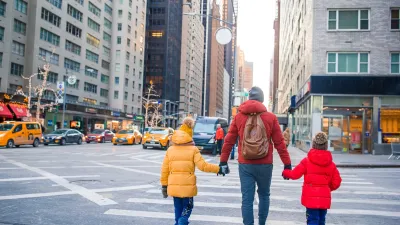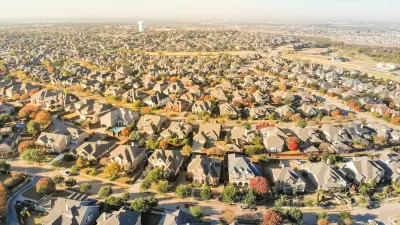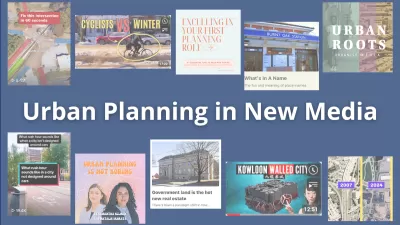Planners are using the popular video platform to explain how car dependence and single-family zoning deepen suburban isolation and affect affordability and sustainability.

Urbanism isn’t entirely new to TikTok, but a new generation of creators passionate about public transit, affordable housing, and walkability is bringing wonky planning concepts like induced demand to a massive young audience. As Sarah Holder writes in Bloomberg CityLab, “Many of the most active posters on TikTok are professionals — or professionals-to-be — in their respective fields, not just armchair urbanists. But the app doesn’t favor individual personalities, and like-minded posters don’t generally congregate in groups.” According to Holder, “While their content varies, these creators share a similar goal: to spread the gospel of urbanism to a new generation, and push policies that advance environmental adaptation and housing affordability.”
During the pandemic, when many suburban teens found themselves isolated in their car-centric neighborhoods, some TikTok creators found an opportunity to reach young people with videos that explained the historical reasons why the suburbs are often so “deeply isolating” for teens. “Deterring car dependence, exposing the violence of urban renewal, and diversifying cookie-cutter neighborhoods zoned for single-family homes are recurrent themes.”
Others found themselves showing diverse representation in the urban planning field, prompting teens to find out more about the profession. According to city planner and TikTok-er Brittany Simmons, “A lot of people don’t know what these fields are.” Simmons continues, “It’s not that they’re not interested; they literally just don’t know that they exist.”
“When it comes to reshaping the physical world, some creators acknowledge that online virality can only go so far.” Still, writes Holder, “it's certainly getting more people to care.”
FULL STORY: On TikTok, Teens Stuck in the Suburbs Get the Urbanist Pitch

Alabama: Trump Terminates Settlements for Black Communities Harmed By Raw Sewage
Trump deemed the landmark civil rights agreement “illegal DEI and environmental justice policy.”

Study: Maui’s Plan to Convert Vacation Rentals to Long-Term Housing Could Cause Nearly $1 Billion Economic Loss
The plan would reduce visitor accommodation by 25% resulting in 1,900 jobs lost.

Planetizen Federal Action Tracker
A weekly monitor of how Trump’s orders and actions are impacting planners and planning in America.

Waymo Gets Permission to Map SF’s Market Street
If allowed to operate on the traffic-restricted street, Waymo’s autonomous taxis would have a leg up over ride-hailing competitors — and counter the city’s efforts to grow bike and pedestrian on the thoroughfare.

Parklet Symposium Highlights the Success of Shared Spaces
Parklets got a boost during the Covid-19 pandemic, when the concept was translated to outdoor dining programs that offered restaurants a lifeline during the shutdown.

Federal Homelessness Agency Places Entire Staff on Leave
The U.S. Interagency Council on Homelessness is the only federal agency dedicated to preventing and ending homelessness.
Urban Design for Planners 1: Software Tools
This six-course series explores essential urban design concepts using open source software and equips planners with the tools they need to participate fully in the urban design process.
Planning for Universal Design
Learn the tools for implementing Universal Design in planning regulations.
Caltrans
Smith Gee Studio
Institute for Housing and Urban Development Studies (IHS)
City of Grandview
Harvard GSD Executive Education
Toledo-Lucas County Plan Commissions
Salt Lake City
NYU Wagner Graduate School of Public Service





























